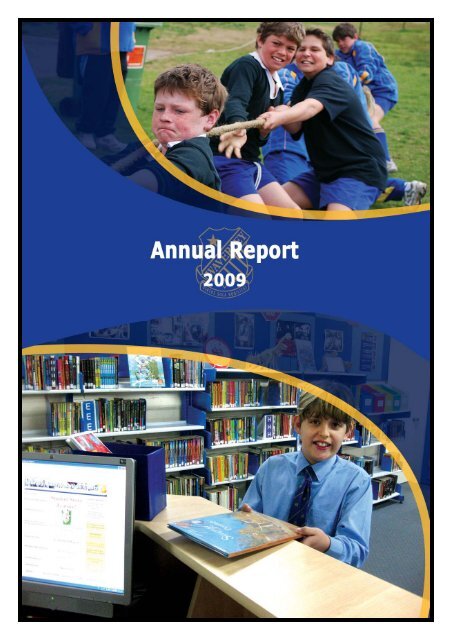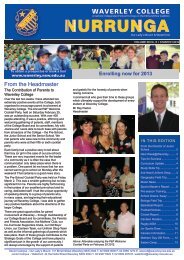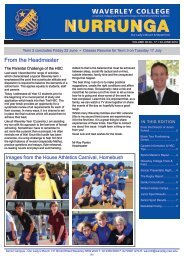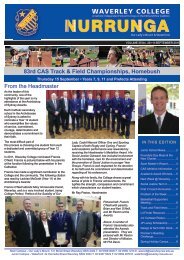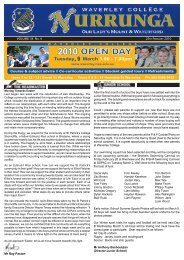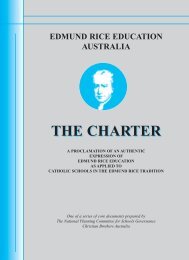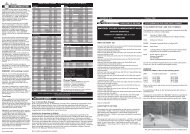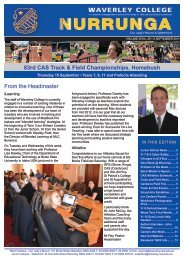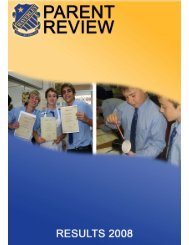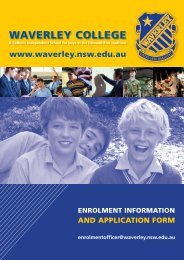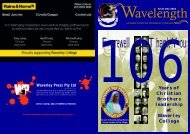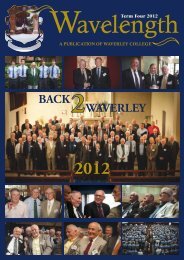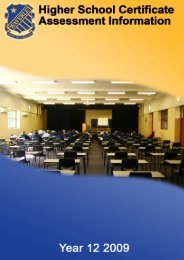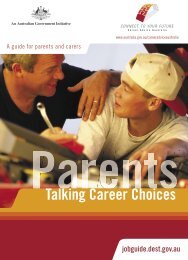2009 Annual Report (1MB) - Waverley College
2009 Annual Report (1MB) - Waverley College
2009 Annual Report (1MB) - Waverley College
Create successful ePaper yourself
Turn your PDF publications into a flip-book with our unique Google optimized e-Paper software.
Opening <strong>College</strong> Mass at St Mary’s CathedralOverview<strong>Waverley</strong> <strong>College</strong> is a Catholic independent boy’s schoollocated in the Eastern Suburbs of Sydney operated in thetradition of Edmund Rice, founder of the ChristianBrothers. The Stated Mission of the <strong>College</strong> is to create anenvironment where it is possible to foster the talents of allstudents in the context of faith. Our aim is the educationof the whole person: spiritually, intellectually,emotionally, culturally, and physically. Further as aCatholic School we strive to communicate and maintainChristian and Catholic faith within the tradition of service in education established by Edmund Riceand continued by the Christian Brothers and their lay partners.<strong>Waverley</strong> <strong>College</strong> offers a comprehensive educational curriculum from Years 5 - 12 based on theNew South Wales Board of Studies Syllabuses. In accordance with the Education Act 1990 (NSW)the <strong>College</strong> is a Registered and Accredited school where students are eligible for the SchoolCertificate and Higher School Certificate. This registration expires at the conclusion of 2011.The <strong>College</strong> has a broad curriculum with a range of educational experiences available for studentsupported by contemporary facilities. The Learning Support Centre (LSC), encompassing LearningSupport and Learning Enrichment programs, is designed to address student needs and extend boysusing an integrated approach to learning. The Performing Arts Centre supports the growing numbersof students electing to complete Music and Drama. The <strong>College</strong> Gymnasium supports the extensivePhysical Development and Health Education Program undertaken by the students both formally andinformally. The introduction of the Vocational Education and Training courses in Stage 6 inHospitality (Operations), Information Technology, Construction and Entertainment has ensuredemployment opportunities for boys once they complete school.The Professional Development of Staff and the provision ofexperiential learning for students are given high priority at the<strong>College</strong>. Access is given to staff for AIS, CEO and externallyoffered Professional Development courses and the staff alsohave access to a Professional Incentive Scheme to encourageinvolvement and development beyond the classroom. Similarly,provisions are made within the <strong>College</strong> Calendar for eachFaculty to provide students with experiences beyond theclassroom through a range of excursions, field studies andperformances.Getting ready for Anzac DayThroughout its curriculum, <strong>Waverley</strong> <strong>College</strong> is ever conscious that the <strong>College</strong> exists for the benefitof its students. Within a world of change and development the <strong>College</strong> accepts the challengespresented to any organization within this environment and is committed to the <strong>College</strong>'s tradition ofproviding quality education allowing each of its students to realise their full potential.The <strong>College</strong> operates on two campuses. The Waterford campus, situated in Henrietta Street<strong>Waverley</strong>, operates as the Junior School for Years 5 & 6 boys and Pre-school for 2 – 5 year olds. TheSenior Campus, Our Lady’s Mount in Birrell Street, operates as the Senior School for Years 7 – 12boys.Approximately 1250 boys from over 100 suburbs throughout Sydney are enrolled at the <strong>College</strong>. Wehave 101.5 academic staff, including counsellors, special education staff and a <strong>College</strong> Chaplain, aswell as 22.8 Administration Staff and 12.4 Building Operations, Maintenance and other staff.<strong>Waverley</strong> <strong>College</strong> <strong>Annual</strong> <strong>Report</strong> <strong>2009</strong> 2
The National Assessment Program – Literacy and Numeracy (NAPLAN)The National Assessment Program – Literacy and Numeracy (NAPLAN) tests are conductedin May each year for all students across Australia in Years 3, 5, 7 and 9. All students in thesame year level are assessed on the same test items in the assessment domains of Reading,Writing, language Conventions (Spelling, Grammar and Punctuation) and Numeracy.NAPLAN results are reported using five national achievement scales, one for each of theNAPLAN assessment domains of Reading, Writing, Spelling Grammar and Punctuation andNumeracy. Each scale consists of ten bands, which represent the increasing complexity of theskills and understandings assessed by NAPLAN from Years 3 to 9.Six of these bands areused for reporting student performance in each year level.The report shows a comparison ofthe student’s result to the national average for the year. The bottom band indicates a studentis below the national minimum standard, and the second bottom band indicates the student isat the national minimum standard.The results of <strong>Waverley</strong> students show soundprogress in the areas of literacy and numeracy. Allthree year levels tested showed results at abovestate / national average in Overall Literacy andNumeracy.Details on school performance are provided in thefollowing tables where band distributions andpercentages of students achieving the nationalminimum standard are outlined separately for Year5, Year 7 and Year 9.Year 5 band distributions and % of students at or above national minimum:ReadingWritingSpellingGrammar &PunctuationOverallLiteracyNumeracyBand3 (-) %Band4 %Band5 %Band6 %Band7 %Band8 %<strong>Waverley</strong> 1 5 24 20 34 16National 6 12 21 21 25 15<strong>Waverley</strong> 1 2 14 49 22 11National 5 10 21 37 17 10<strong>Waverley</strong> 1 5 22 33 28 11National 5 11 20 27 24 13<strong>Waverley</strong> 0 3 11 32 33 21National 7 10 16 28 25 15<strong>Waverley</strong> 0 2 16 39 30 12National 4 9 22 30 23 11<strong>Waverley</strong> 1 3 9 27 34 26National 3 14 25 24 19 16<strong>Waverley</strong> <strong>College</strong> <strong>Annual</strong> <strong>Report</strong> <strong>2009</strong> 5
Year 7 band distributions and % of students at or above national minimum:ReadingWritingSpellingGrammar &PunctuationOverallLiteracyNumeracyBand4 (-) %Band5 %Band6 %Band7 %Band8 %Band9 %<strong>Waverley</strong> 1 5 21 31 30 12National 5 13 25 25 21 11<strong>Waverley</strong> 2 9 33 30 21 6National 7 11 32 24 18 9<strong>Waverley</strong> 1 2 22 35 26 12National 5 10 24 29 20 13<strong>Waverley</strong> 1 7 25 32 14 20National 7 14 25 28 9 17<strong>Waverley</strong> 0 6 17 47 24 6National 5 11 26 31 19 9<strong>Waverley</strong> 0 6 17 26 28 22National 4 14 25 23 19 14Year 9 band distributions and % of students at or above national minimum:ReadingBand5 (-) %Band6 %Band7 %Band8 %Band9 %Band10 %<strong>Waverley</strong> 2 7 23 42 19 8National 67 14 24 30 19 6Writing<strong>Waverley</strong> 4 23 25 27 13 8National 11 22 23 24 12 8Spelling<strong>Waverley</strong> 4 7 25 34 22 9National 8 12 27 26 16 11Grammar &Punctuation<strong>Waverley</strong> 4 9 27 32 16 11National 10 14 30 24 13 9OverallLiteracyNumeracy<strong>Waverley</strong> 1 9 32 34 18 6National 7 15 29 28 15 6<strong>Waverley</strong> 0 7 12 37 34 10National 3 15 26 26 18 12<strong>Waverley</strong> <strong>College</strong> <strong>Annual</strong> <strong>Report</strong> <strong>2009</strong> 6
School Certificate <strong>2009</strong> - Mathematics40353025% 2015StateSchool1050Band 6 Band 5 Band 4 Band 3 Band 2 Band 1 NoneSchool Certificate <strong>2009</strong> - Science4540353025%20StateSchool151050Band 6 Band 5 Band 4 Band 3 Band 2 Band 1 None<strong>Waverley</strong> <strong>College</strong> <strong>Annual</strong> <strong>Report</strong> <strong>2009</strong> 8
School Certificate <strong>2009</strong> - History5045403530% 2520StateSchool151050Band 6 Band 5 Band 4 Band 3 Band 2 Band 1 NoneSchool Certificate <strong>2009</strong> - Geography403530%252015StateSchool1050Band 6 Band 5 Band 4 Band 3 Band 2 Band 1 NoneNewly elected prefects for <strong>2009</strong>-2010<strong>Waverley</strong> <strong>College</strong> <strong>Annual</strong> <strong>Report</strong> <strong>2009</strong> 9
Higher School Certificate <strong>2009</strong>The class of <strong>2009</strong> celebrated a number of excellent group and individual results in the <strong>2009</strong>Higher School Certificate. <strong>Waverley</strong> <strong>College</strong> was listed on the Sydney Morning HeraldHonour Roll for Mathematics and English.One of the most pleasing aspects of the results was the performance of students across arange of Courses and the consistency of their results. The <strong>College</strong>’s highest ATAR was 98.3with approximately 23 students receiving an ATAR above 90. Approximately 78% of HSCmarks were above 70 (Bands 4, 5 or 6). 28 of the 35 subjects received results above the stateaverage and 21 of the 35 subjects had results in the Band 6 category. Considering <strong>Waverley</strong>does not exclude students on the basis of academic ability, these results would indicate<strong>Waverley</strong> students continue to perform very well against the rest of the state.In Visual Arts, 2 students had their major works selected for ArtExpress and 100% ofstudents studying the course received a mark greater than 70 out of 100. In IndustrialTechnology 2 students had their major works selected for InTECH. A student at the <strong>College</strong>was placed 6 th in the state for the Construction Examination. In English Extension 2, 100% ofstudents achieved a course mark of greater than 45 out of 50 (E4).The figures below indicate very few marks below 50 in any course. Below are the total numbers ofbands awarded in all subjects.69 Band 6 (a mark of 90 or better)313 Band 5 (a mark between 80 – 89)317 Band 4 (a mark between 70 – 79)167 Band 3 (a mark between 60 – 69)30 Band 2 (a mark between 50 – 59)5 Band 1 (a mark below 50A number of students also undertake Extension Courses. The Bands are allocated differentlyfor these subjects. Below are the total numbers of bands awarded for Extension Courses.9 Band E4 (a mark of 45 – 50)34 Band E3 (a mark of 35 – 44)3 Band E2 (a mark of 25 – 34)1 Band E1 (a mark of 0 – 24)Explaining BandsHSC Bands are awarded to students based on the HSC Mark in each subject. The HSC Mark for asubject is the average of the Examination Mark and Moderated Assessment Mark. Band 6 requires aHSC Mark 90+; Band 5 a mark between 80 – 89; Band 4 a mark between 70 – 79; Band 3 a markbetween 60 – 69; Band 2 a mark between 50 – 59; and Band 1 a mark below 50.Graph showing HSC Bands for <strong>2009</strong><strong>Waverley</strong> <strong>College</strong> <strong>Annual</strong> <strong>Report</strong> <strong>2009</strong> 10
Post-School DestinationsStudents at <strong>Waverley</strong> <strong>College</strong> can choose an academic or non-academic pathway for study for theHigher School Certificate. The <strong>College</strong> offers two clearly defined patterns of study. An ATARpathway ensures students qualify for the Australian Tertiary Entrance Rank (ATAR) leading studentsto further study at university while a non-ATAR pathway directs students to seek an apprenticeship,further study at TAFE or full-time employment.Of the students who completed their HSC in <strong>2009</strong>, only 1% are still looking for work. Approximately71% of the candidature was offered places over a range of courses at universities in Sydney, themajority gaining entrance to the University of New South Wales and Sydney University. OtherUniversities that accepted several <strong>Waverley</strong> <strong>College</strong> students include Macquarie University,University of Technology, Australian Catholic University and Notre Dame Sydney. A number ofstudents also applied for positions at private <strong>College</strong>s.Approximately 21% obtained apprenticeships, continued study at TAFE, entered small business (egreal estate) real estate or other family businesses.The graph below represents the destinations of the <strong>2009</strong> Higher School candidature.TEACHER STANDARDSTeacher Qualifications107 teachers were employed at <strong>Waverley</strong> <strong>College</strong> to deliver Curriculum from Years 5 – 12. Thisincludes temporary positions replacing teachers on Leave for periods longer than one school term. Allbut one teacher employed at <strong>Waverley</strong> <strong>College</strong> in <strong>2009</strong> held formal qualifications from highereducation institutions within Australia or as recognised within the National Office of Overseas SkillsRecognition guidelines.The majority (97%) of the teaching staff holds a bachelor degree as a minimum qualification. 32% ofstaff hold post-graduate qualifications. These degrees range across a number of disciplines.<strong>Waverley</strong> <strong>College</strong> <strong>Annual</strong> <strong>Report</strong> <strong>2009</strong> 11
QualificationQual. TotalIndividual’sHighest QualificationCertificate II 0 - 0 %Certificate IV 2 - 0Certificate 14 - 0Diploma 85 5 4Graduate Certificate 6 - 0Graduate Diploma 20 2 2Honorary Degree 0 - 0Bachelor Degree 100 72 64Bachelor Degree (Honours) 12 12 10Master Degree 25 22 18Doctoral Degree 3 3 2Professional LearningThe <strong>College</strong> encouraged teaching staff to undertake ongoing professional learning throughout theyear. Over $33,000 was allocated in <strong>2009</strong> to professional development staffing beyond the five pupilfree days within the <strong>College</strong> calendar annually. The breadth of these courses included subject specificin-servicing, pedagogical development and network meetings to ensure currency with Board ofStudies requirements.Teacher Attendance & RetentionAt any one time there were ninety two teachers employed at <strong>Waverley</strong> <strong>College</strong> at the senior campuswith another fifteen employed at the junior campus. Thirteen staff changes took place during the <strong>2009</strong>year, including replacements for two staff on maternity leave, eight staff leaving to take up positionsin other schools and three staff retiring. Teacher attendance is approximately 95%.STUDENT RETENTION RATESThe enrolment at the date of the <strong>2009</strong>Census was 1264 students.The retention rate from Year 10 2007 toYear 12 <strong>2009</strong> was 78%.The average student attendance rate for<strong>2009</strong> was 95.15%.SATISFACTION(a) StaffParticipants at the National Interactive Whiteboard Conference held at the<strong>College</strong> in October <strong>2009</strong>All new staff are given two day inductions to the <strong>College</strong> and are mentored for their first year.Professional development is actively encouraged and funded. In addition to staff days to begin eachterm, the <strong>College</strong> conducts weekly staff meetings, monthly staff meetings and convenes workingparties and committees as required; all staff are encouraged to become involved. All leaving staff areinvited to attend an exit interview.<strong>Waverley</strong> <strong>College</strong> <strong>Annual</strong> <strong>Report</strong> <strong>2009</strong> 12
(b) StudentsEach year group has a Student Representative Council and the Senior Prefects of the <strong>College</strong> aregiven a prominent role. The small vertical home group structure at the <strong>College</strong> on a ratio of around 12to 1 ensures that the students always have an avenue for expressing their satisfaction.(c) ParentsMeetings and Information Evenings: Parent/Teacher evenings are held for each year group from 5 to12 at least twice each year. Information evenings are held at least once a year for each year groupwith some years having two. Attendance at these information nights is usually between 90 and 95 percent attendance. A weekly newsletter is sent to parents either electronically or in hard copy eachweek. Parent representatives are a part of the <strong>College</strong> Board. The <strong>College</strong> also supports the <strong>College</strong> P& F, Mothers Club, and most sports at the <strong>College</strong> have Parent Supporters Clubs which are run by theparents.Satisfaction Surveys: A comprehensive parent satisfaction survey was conducted during <strong>2009</strong> whichincluded the following issues:• How happy are you with your decision to enrol your son at <strong>Waverley</strong> <strong>College</strong>?• Quality of Teachers• Overall behaviour of students at the school• Strength of academic programs at the school• Level of communication with parents• Value systems taught and experienced at the school• School discipline & Pastoral Care• Learning about the Catholic Faith in Religious Education programs• Class sizes• Dress and presentation of students at school• Extra-Curricular activities, including sport and performing arts• Facilities and resources at the school• Level of safety and care for the students• The quality of the <strong>College</strong> Executive Leadership Team• Facilities and education in technology/computers• Opportunities for parental involvement• Fairness of the school discipline practices and your son's interactions with staffThis survey provided very positive feedback to the <strong>College</strong> Executive and supportedplanning for 2010.Junior and Pre-School Staff<strong>Waverley</strong> <strong>College</strong> <strong>Annual</strong> <strong>Report</strong> <strong>2009</strong> 13
ENROLMENT POLICY & PROFILE<strong>Waverley</strong> <strong>College</strong> has a non-selective enrolment policy. Primary intakes are taken at Years 5 and 7.Limited places are available in other years dependent on total enrolments. Preference is given toCatholic students, students with siblings already attending the <strong>College</strong> and to sons of old boys.A member of the <strong>College</strong> Executive interviews all students applying to the <strong>College</strong> along with theirparents prior to final acceptance.A reference is required from the Parish Priest, Minister of Religion or some other person in theCommunity; and a copy of the two most recent school reports must be provided. We also ask to seethe Birth Certificate and Baptism Certificate.Once a child has enrolled at the <strong>College</strong>, parents become part of the Parents and Friends Associationand the Mothers’ Club.All children of parents who are prepared to support the religious principles and ideals of this schoolare considered eligible for enrolment. The following group of applicants will however have a priorityover others in admissions:• Members of the Catholic community;• Sons of Old Boys of the <strong>College</strong>;• Brothers of those who have attended or are attending the <strong>College</strong>;• Those who attended schools traditionally associated with entrance to <strong>Waverley</strong> <strong>College</strong> atthat age.The Headmaster shall determine the Year of entry of a boy after appropriate consideration of theBoard of Studies rules and the previous progress of the boy. Children of socially, culturally orfinancially disadvantaged families may receive special consideration.Applications and further information are available on the <strong>College</strong> Website:www.waverley.nsw.edu.au or from the <strong>College</strong> Enrolment Secretary.The Brother JP Lacey ScholarshipEach year an examination is held at the <strong>College</strong> for Year Six students for the Br JP LaceyScholarship. This Scholarship is awarded by the Old Boys' Union in memory of Br Lacey who was amemorable figure at <strong>Waverley</strong> for many years and Headmaster from 1948-1953. This examination ispart of a Co-operative Scholarship Testing Programme organised by the Australian Council forEducation Research Limited and is used by many schools as the means of their scholarship award.Archbishop’s Awards Presentation<strong>Waverley</strong> <strong>College</strong> <strong>Annual</strong> <strong>Report</strong> <strong>2009</strong> 14
STUDENT WELFAREEveryone in the <strong>College</strong> community is involved in pastoral care. A commitment to partnership andshared responsibility amongst staff, students, parents and other family members is an integral featureof pastoral care at <strong>Waverley</strong> <strong>College</strong>.While pastoral care initiatives respect the privacy of students’ lives, some students and their familiesactively seek the <strong>College</strong>’s support in times of crisis and instability. Within the limits of its resourcesand expertise, <strong>Waverley</strong> <strong>College</strong> is committed to the well being of its students.Pastoral care at <strong>Waverley</strong> <strong>College</strong> is vitally concerned with the fostering of student’s self-discipline.It aims to develop students who are responsible and inner directed, capable of choosing freely inconformity with their conscience. Pastoral care also contributes to students recognising that theirfundamental freedoms and rights are reciprocated by responsibilities.Organisational StructuresIn the <strong>College</strong>’s daily and routine life, the way in which people interact witheach other significantly affect each student’s sense of self worth, belonging andwell being. The Home Group Teacher is the primary contact for the student’sspiritual, intellectual, emotional, cultural, and physical development over his sixyears in the Senior School. If a student is having a problem in class or withsome misunderstanding of the subject then the class teacher should be the firstpoint of contact; failing here, then the Head of Department. If the student has adisciplinary problem the Year Master is usually the contact. Yet in all this theHome Group Teachers will be involved and hold in their hands the long-termpastoral care of the student. The system provides continuity and consistency ofcare.The Role of the Home Group TeacherThe Home Group consists of a teacher and usually two to three students from each of the six yearswithin the <strong>College</strong>. The number of students in each group is approximately fourteen. The purpose ofthe Home Group is to provide for each student a family type group where a staff member individuallyknows them and relationships are fostered between different age levels. The Home Group Teacher isa significant adult in the lives of the students who provides them support, understanding andencouragement. Boys in a Home Group are vertically arranged with boys ranging from Year 7 toYear 12.The Home Group Teacher:• Will conduct ten-minute meetings five times a week.• Provides a Christian example and model by word and action.• Takes a personal interest in, helps, guides, directs and fosters the spiritual, intellectual,emotional, cultural, and physical development of their boys.• Fosters interpersonal relationships and communication between group members.• Oversees the students’ academic reports, and discusses any serious problems with studentsand their parents.• Works in partnership with class teachers, coaches and all who have dealings with a boy.The full text of this policy is provided to all new parents and students entering the <strong>College</strong>.Updated copies are available on the <strong>College</strong> website: http://www.waverley.nsw.edu.au/publications<strong>Waverley</strong> <strong>College</strong> <strong>Annual</strong> <strong>Report</strong> <strong>2009</strong> 15
DISCIPLINE POLICYThe <strong>College</strong> Discipline Policy underwent a period of review during 2003. It was implemented in 2004and was well received by staff, students and parents. It ensures <strong>College</strong> expectations are made explicitand students are made aware of the consequences of their actions. Central to the Policy is the signingof the Student Agreement and Commitment that appears in the Student Diary. Students and parentssign this agreement when first enrolling and it is re-signed at the beginning of each academic year.The Student Diary outlines the <strong>College</strong> Policy, Rules and Regulations related to student discipline.Policies covering the following issues exist within the <strong>College</strong> Diary:• Homework• Entitlements & Responsibilities• Bullying• Haircuts & Uniform• Saturday Sport• Behaviour on Buses & Trains• Drug & Alcohol PolicyCopies of these policies are available on the <strong>College</strong> website:http://www.waverley.nsw.edu.au/publicationsPreferred Practices of Teachers1. The School’s rules form the basis of all behaviour management and disciplineThis requires teachers to:• Teach the school rules in the context of their particular class• Determine and discuss regulations arising out of the rules• Establish a set of routines that must be adhered to: e.g. seating plan, line up outside theclassroom, prayer, pick up all rubbish before leaving the room.• When correcting behaviour teachers will refer to ‘What rule was broken?’2. Use Positive Corrective PracticeThis requires teachers to:• Plan for managing expected difficulties• Use of least-to-most intrusive intervention• Focus is on the primary behaviour• Tell students what it is that they should be doing• Use encouragement, praise and rewards• Re-establish working relationships as soon as possible after correction“Shout” at Parade Theatre NIDA <strong>2009</strong><strong>Waverley</strong> <strong>College</strong> <strong>Annual</strong> <strong>Report</strong> <strong>2009</strong> 16
Model, and expect RespectThis requires teachers to:• Separate the behaviour from the person• Use of appropriate language• Use of private reprimands4. Utilizing related and reasonable consequencesThis requires teachers to:• Regularly clarify consequences with students and apply them as necessary• Emphasize the relatedness of the outcome to the behaviour• Use consistency in applicationStaff Qualities & Key ValuesThe <strong>College</strong> operates and leads based on the values of:• Respect for the individual• Tolerance• Academic integrityThese are modelled in the following ways:• Our use of inclusive, hope-filled language• Our clear, consistent approach to discipline: appropriate to boys, understanding of diversity• Balancing the rights of the individual with the needs of the group• Respecting the importance of punctuality, collegial support and appropriate dress• Recognising the importance of problem solving and the ongoing need for team workand conflict resolution.The full text of these policies and documents is available on the <strong>College</strong> website:http://www.waverley.nsw.edu.auHouse Banners<strong>Waverley</strong> <strong>College</strong> <strong>Annual</strong> <strong>Report</strong> <strong>2009</strong> 17
COMPLAINTS AND GRIEVANCE RESOLUTIONThe <strong>College</strong>’s policy for dealing with complaints and grievances includes processes for raising andresponding to matters of concern identified by parents and/or students. These processes incorporate,as appropriate, principles of sensitivity, confidentiality and procedural fairness.The majority of concerns that arise from parents and/or students need never take the form of a formalcomplaint. The Headmaster, Executive, Middle Management staff and teachers are available todiscuss and resolve concerns in more informal ways. Such lines of communication are clearlyoutlined in the <strong>College</strong> diary and at information sessions involving each year group every year. Eachyear group has a Student Representative Council as a means of communication between students andthe <strong>College</strong>. Other avenues of communication include Home Group Teachers, Year Masters, Heads ofDepartment (curriculum issues) and Executive members with specific areas of responsibility.Harassment Prevention PolicyIt is the responsibility of all staff to respect the rights of others and ensure that they do not becomeinvolved in or encourage harassment. Every staff member has the legal right to a work/studyenvironment that is safe, and that is not sexually harassing, sexist, racist, homophobic, anti-disability,ageist, or stereotyping in any other way.There is an expectation that, as a Catholic community, all members speak, act and relate in hopeful,compassionate, life-giving ways. Staff must be careful not to do anything that could be interpreted assexually harassing, stereotyping or demeaning people because of their race, sex, disability etc.Harassment Behaviours outlined in the extended policy have been used with permission from theUniversity of Sydney’s ‘Staff and Student Equal Opportunity unit’ website.(http://www.usyd.edu.au/eeo)Staff have access to the full policy via the <strong>College</strong>’s Intranet site.RESPECT AND RESPONSIBILITYBoth the <strong>College</strong>’s Mission Statement and Enrolment Understanding promote respect andresponsibility. All students are taught to respect themselves and others, and celebrate the differencesthat exist within the <strong>College</strong> community.The Student Discipline Policy clearly indicates acceptable behaviour, and was reinforced by suchinitiatives as the anti-bullying program conducted since 2007. Service to others is at the core of the<strong>College</strong> community and is evident through the Year 11 Community Service Program, the SocialJustice Group and the role of the Social Justice Co-ordinator throughout the <strong>College</strong>.CAS Football Huddle<strong>Waverley</strong> <strong>College</strong> <strong>Annual</strong> <strong>Report</strong> <strong>2009</strong> 18
SCHOOL DETERMINED IMPROVEMENT TARGETSStrategic Plan 2007 – 2011The <strong>College</strong> Board in consultation with the <strong>College</strong> Executive, teachers, students, parents andmembers of the broader school community, including the Old Boys Union reviewed the success ofthe previous Strategic Plan and undertook a new Strategic Plan.This Strategic Plan identifies three key areas with various sub headings for development over thenext five years:1. Governance and Stewardship• Governance• Communication• Financial Management• Managing Risks2. <strong>College</strong> Ethos• The <strong>Waverley</strong> <strong>College</strong> Culture3. Curriculum and Teaching Practice• The Learning environment• Student Needs• Teaching Practice• Curriculum DevelopmentA thorough progress check of the 2007-11 Strategic Plan was conducted by the <strong>College</strong> Board in June2010. It was determined that all domains and strategies had achieved their targets. With theappointment of the new Headmaster for 2010, a new Educational Strategy will be developed by the<strong>College</strong> community.Junior School Awards Night <strong>2009</strong><strong>Waverley</strong> <strong>College</strong> <strong>Annual</strong> <strong>Report</strong> <strong>2009</strong> 19
FINANCIAL INFORMATIONThe summary of income and expenditure is presented in graphical form aggregated from financialinformation that is provided annually to the Commonwealth.Total Income: $22,842,814Total Expenditure: $22,477,770I congratulate the <strong>Waverley</strong> <strong>College</strong> community – students, staff, parents, old boys, theChristian Brothers and our Edmund Rice colleagues – for another year of significantachievement.Mr R PaxtonHEADMASTERJune 2010<strong>Waverley</strong> <strong>College</strong> <strong>Annual</strong> <strong>Report</strong> <strong>2009</strong> 20


